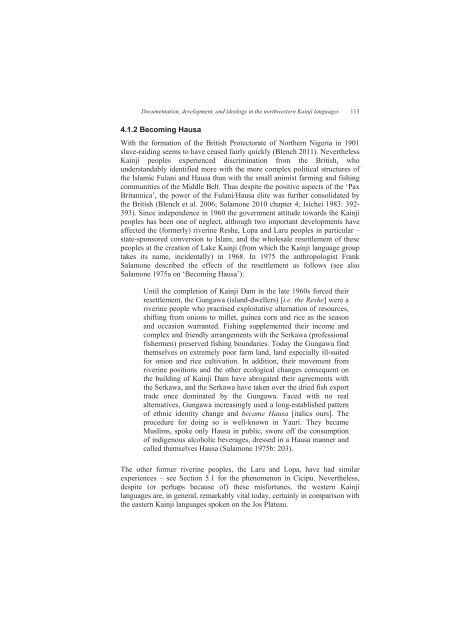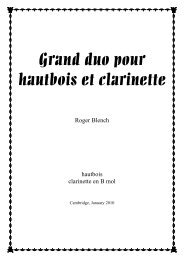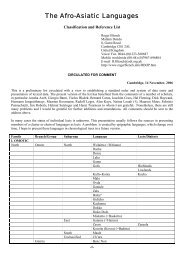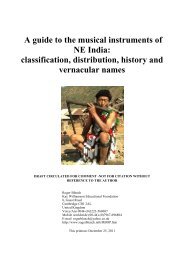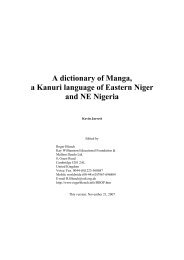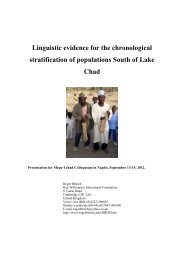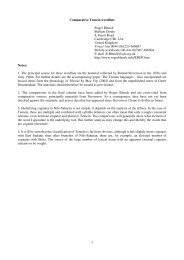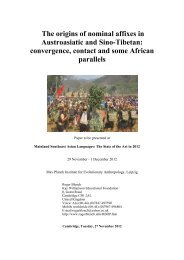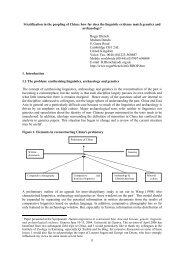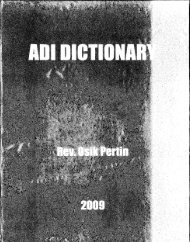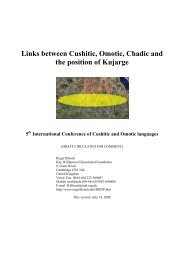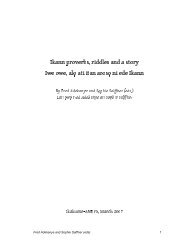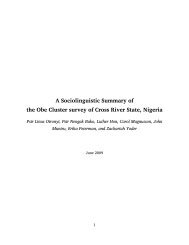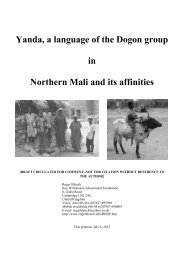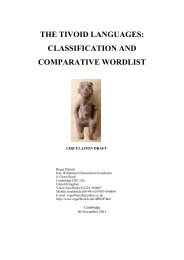Documentation, development, and ideology in the ... - Roger Blench
Documentation, development, and ideology in the ... - Roger Blench
Documentation, development, and ideology in the ... - Roger Blench
You also want an ePaper? Increase the reach of your titles
YUMPU automatically turns print PDFs into web optimized ePapers that Google loves.
<strong>Documentation</strong>, <strong>development</strong>, <strong>and</strong> <strong>ideology</strong> <strong>in</strong> <strong>the</strong> northwestern Ka<strong>in</strong>ji languages 113<br />
4.1.2 Becom<strong>in</strong>g Hausa<br />
With <strong>the</strong> formation of <strong>the</strong> British Protectorate of Nor<strong>the</strong>rn Nigeria <strong>in</strong> 1901<br />
slave-raid<strong>in</strong>g seems to have ceased fairly quickly (<strong>Blench</strong> 2011). Never<strong>the</strong>less<br />
Ka<strong>in</strong>ji peoples experienced discrim<strong>in</strong>ation from <strong>the</strong> British, who<br />
underst<strong>and</strong>ably identified more with <strong>the</strong> more complex political structures of<br />
<strong>the</strong> Islamic Fulani <strong>and</strong> Hausa than with <strong>the</strong> small animist farm<strong>in</strong>g <strong>and</strong> fish<strong>in</strong>g<br />
communities of <strong>the</strong> Middle Belt. Thus despite <strong>the</strong> positive aspects of <strong>the</strong> ‘Pax<br />
Britannica’, <strong>the</strong> power of <strong>the</strong> Fulani/Hausa élite was fur<strong>the</strong>r consolidated by<br />
<strong>the</strong> British (<strong>Blench</strong> et al. 2006; Salamone 2010 chapter 4; Isichei 1983: 392-<br />
393). S<strong>in</strong>ce <strong>in</strong>dependence <strong>in</strong> 1960 <strong>the</strong> government attitude towards <strong>the</strong> Ka<strong>in</strong>ji<br />
peoples has been one of neglect, although two important <strong>development</strong>s have<br />
affected <strong>the</strong> (formerly) river<strong>in</strong>e Reshe, Lopa <strong>and</strong> Laru peoples <strong>in</strong> particular –<br />
state-sponsored conversion to Islam, <strong>and</strong> <strong>the</strong> wholesale resettlement of <strong>the</strong>se<br />
peoples at <strong>the</strong> creation of Lake Ka<strong>in</strong>ji (from which <strong>the</strong> Ka<strong>in</strong>ji language group<br />
takes its name, <strong>in</strong>cidentally) <strong>in</strong> 1968. In 1975 <strong>the</strong> anthropologist Frank<br />
Salamone described <strong>the</strong> effects of <strong>the</strong> resettlement as follows (see also<br />
Salamone 1975a on ‘Becom<strong>in</strong>g Hausa’):<br />
Until <strong>the</strong> completion of Ka<strong>in</strong>ji Dam <strong>in</strong> <strong>the</strong> late 1960s forced <strong>the</strong>ir<br />
resettlement, <strong>the</strong> Gungawa (isl<strong>and</strong>-dwellers) [i.e. <strong>the</strong> Reshe] were a<br />
river<strong>in</strong>e people who practised exploitative alternation of resources,<br />
shift<strong>in</strong>g from onions to millet, gu<strong>in</strong>ea corn <strong>and</strong> rice as <strong>the</strong> season<br />
<strong>and</strong> occasion warranted. Fish<strong>in</strong>g supplemented <strong>the</strong>ir <strong>in</strong>come <strong>and</strong><br />
complex <strong>and</strong> friendly arrangements with <strong>the</strong> Serkawa (professional<br />
fishermen) preserved fish<strong>in</strong>g boundaries. Today <strong>the</strong> Gungawa f<strong>in</strong>d<br />
<strong>the</strong>mselves on extremely poor farm l<strong>and</strong>, l<strong>and</strong> especially ill-suited<br />
for onion <strong>and</strong> rice cultivation. In addition, <strong>the</strong>ir movement from<br />
river<strong>in</strong>e positions <strong>and</strong> <strong>the</strong> o<strong>the</strong>r ecological changes consequent on<br />
<strong>the</strong> build<strong>in</strong>g of Ka<strong>in</strong>ji Dam have abrogated <strong>the</strong>ir agreements with<br />
<strong>the</strong> Serkawa, <strong>and</strong> <strong>the</strong> Serkawa have taken over <strong>the</strong> dried fish export<br />
trade once dom<strong>in</strong>ated by <strong>the</strong> Gungawa. Faced with no real<br />
alternatives, Gungawa <strong>in</strong>creas<strong>in</strong>gly used a long-established pattern<br />
of ethnic identity change <strong>and</strong> became Hausa [italics ours]. The<br />
procedure for do<strong>in</strong>g so is well-known <strong>in</strong> Yauri. They became<br />
Muslims, spoke only Hausa <strong>in</strong> public, swore off <strong>the</strong> consumption<br />
of <strong>in</strong>digenous alcoholic beverages, dressed <strong>in</strong> a Hausa manner <strong>and</strong><br />
called <strong>the</strong>mselves Hausa (Salamone 1975b: 203).<br />
The o<strong>the</strong>r former river<strong>in</strong>e peoples, <strong>the</strong> Laru <strong>and</strong> Lopa, have had similar<br />
experiences – see Section 5.1 for <strong>the</strong> phenomenon <strong>in</strong> Cicipu. Never<strong>the</strong>less,<br />
despite (or perhaps because of) <strong>the</strong>se misfortunes, <strong>the</strong> western Ka<strong>in</strong>ji<br />
languages are, <strong>in</strong> general, remarkably vital today, certa<strong>in</strong>ly <strong>in</strong> comparison with<br />
<strong>the</strong> eastern Ka<strong>in</strong>ji languages spoken on <strong>the</strong> Jos Plateau.


